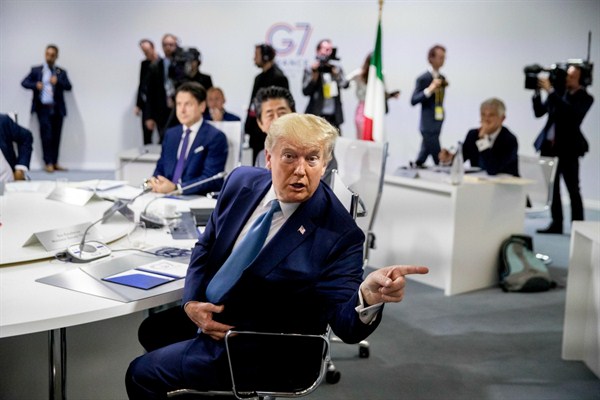In a provocative new book, three scholars from the libertarian Cato Institute—John Glaser, Christopher A. Preble and A. Trevor Thrall—counsel the United States to abandon the pursuit of global primacy for a policy of prudence and restraint. “Fuel to the Fire: How Trump Made America’s Foreign Policy Even Worse (and How We Can Do Better)” is a scalding indictment not only of the 45th U.S. president, but also of a morally bankrupt national security establishment whose addiction to empire has embroiled the nation in misbegotten military misadventures. American foreign policy professionals may cast the United States as a benevolent hegemon, defending the liberal or “rules-based” international order. But this self-serving argument is hard to take seriously, they write, given the hubris, hypocrisy and coerciveness of the American imperium.
The most surprising argument in “Fuel to the Fire” is that this misguided orientation has persisted under Donald Trump. This seems counterintuitive. Washington’s mandarins have recoiled in bipartisan horror as the president dismantles their handiwork and pursues his “America First” agenda. Glaser, Preble and Thrall see Trump—the “least informed, least experienced, and least intellectually prepared U.S. president in modern memory”—as more bark than bite. True, he has altered specific U.S. positions on trade (more protectionism), immigration (greater closure) and human rights (deafening silence). But, on balance, they perceive a depressing continuity between Trump’s foreign policy and what preceded it. Abetted by an invertebrate Congress and emboldened by the military-industrial complex, Trump has doubled down on the imperial presidency, on inflated threat perceptions, on defense spending and on the pursuit of global domination. In so doing, they claim, Trump is setting a course for continued interventionism that is at odds with U.S. ideals and dangerous to American liberty.
The problem with primacy is that it is inherently self-defeating. Abroad, it creates foreign antibodies that sap U.S. power and legitimacy. At home, it weakens the very political principles and institutions that national defense is supposed to protect. Instead of primacy, Glaser, Preble and Thrall advocate restraint—a policy based on “cautious prudence, non-intervention… and a more modest set of objectives and interests.”

